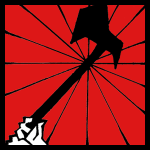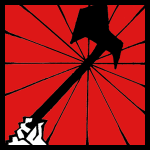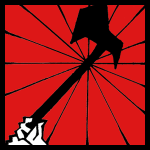FP240 – The Murder Plague: Responsibility, Part 3 of 3
Welcome to Flash Pulp, episode two hundred and forty.
![]() Tonight we present, The Murder Plague: Responsibility, Part 3 of 3.
Tonight we present, The Murder Plague: Responsibility, Part 3 of 3.
(Part 1 – Part 2 – Part 3)
(RSS / iTunes)
This week’s episodes are brought to you by Lifestyle Jazz.
Flash Pulp is an experiment in broadcasting fresh pulp stories in the modern age – three to ten minutes of fiction brought to you Monday, Wednesday and Friday evenings.
Tonight, Harm Carter finds himself caught between a crazed sheriff and an armoured combat vehicle.
The Murder Plague: Responsibility, Part 3 of 3
Written by J.R.D. Skinner
Art and Narration by Opopanax
and Audio produced by Jessica May
 Mr. Baldy’s first instinct seemed to be to follow the sheriff into the apartment building, but, in a rare of fit of reason, he instead turned to me and asked what I thought we should do.
Mr. Baldy’s first instinct seemed to be to follow the sheriff into the apartment building, but, in a rare of fit of reason, he instead turned to me and asked what I thought we should do.
As he spoke, the girl in his arms began to squirm.
While I considered my response, the armoured vehicle turned onto the roundabout fronting the tower. As it slowed, its roaming weapon ceased its circling patrols and focused its accusing finger directly at us.
I was quite familiar with the model of transport, as my final army posting had been warming the interior bench of just such a buggy. I knew it required at least one driver and one gunner to be operating as it was, and a homicidal crew wouldn’t last long in so tight a space.
It was oddly comforting, in a way, but my thoughts had taken an odd path: I was increasingly convinced that I was at risk of never being able to find my way back to Becky – or worse, that these men would harm her, if they could.
Despite my concerns, I said, “they aren’t infected.”
We waited until they’d rumbled to a halt in the guest parking space that must have once been regularly occupied by pizza delivery cars. Once stopped, the beetle’s recessed loud speaker whined briefly, and a voice that could be no older than twenty-one asked, “is this the entirety of your group?”
I wondered briefly if he was reading from the same sort of suggestion card that we used to be issued; the kind filled with helpful phrases for dealing with exotic locals, although I suspected his was something closer to a flowchart for dealing with the murderously insane.
Baldy replied, “there’s another guy, but he took off when you came around the corner.”
He still hadn’t learned the value of important information, so I added, “-and he’s crazy.”
To which the youth behind the armour replied, “yeah, that’ll happen.”
Before he could find the next step on his chart, Weaver made his re-appearance, some five floors up. Actually, he may have been on the balcony a while; it was really only his scream of, “gimme back my mother, you thieving bastards,” that drew our attention.
Despite his statement, he wasn’t in much mood to bargain, as he made clear by tossing two flame-topped bottles onto our visitors’ chariot. Although the impact of the Molotov cocktails threw glass and liquid flame in every direction, we’d kept our distance from the imposing transport, and it saved us from injury.
Unsurprisingly, however, the driver wasn’t terribly impressed with the sheriff’s guerrilla recycling effort, and the vehicle’s engine roared with his displeasure. He had little sympathy for the building’s once well-maintained decorative flower bed as he pulled away from the pavement and found the quickest route back to the road.
As they ran, the thing’s cannon tracked upwards, but the violence I anticipated never arrived. They simply drove off, with a flaming roof.
For a moment silence descended, then the toddler returned to weeping. Baldy looked as if he were ready to join her.
We couldn’t see Weaver, as we’d sheltered under the lip of the lobby canopy, but it was difficult to forget that he was up there.
It must have been the girl that drew his attention, as he suggested we, “ought to come out where he could see us.”
To move forward, into the open, seemed a sure way of relieving ourselves of the burdens of the world, but I didn’t much like the idea of retreating into the potential house of horrors that the apartment building represented.
The longer we took in thinking about it, the more I became sure the sheriff had retreated from the balcony, and would be arriving behind us shortly.
I panicked briefly, feeling as if I were on a rapidly deflating life raft, and then the clatter returned.
It wasn’t like the original, cautious, approach – watching the abrupt turns, I cringed at the brutality their seat belts must have been absorbing. They paused on the street, swung backwards, and sent their tail barreling in our direction.
Until the last second, I wasn’t sure if they would stop short of running us down. As it was, we were forced to step back as the rear hatch split wide.
The owner of the young voice reached out with waving hands, while shouting, “get in, get in,” from behind his full-body hazardous materials combat-suit.
I’d like to say that, in a moment of clarity, I pushed Baldy and the child inside, then ran, because I thought I was a danger to them. It’s not true, though.
I did it because I was convinced the stranger in the black suit would permanently take me away from Becky – I did it because the sickness had taken hold.
Flash Pulp is presented by http://skinner.fm, and is released under the Canadian Creative Commons Attribution-Noncommercial 2.5 License.
Freesound.org credits:
Text and audio commentaries can be sent to skinner@skinner.fm, or the voicemail line at (206) 338-2792 – but be aware that it may appear in the FlashCast.
– and thanks to you, for reading. If you enjoyed the story, tell your friends.
 “You, sir, have the intelligence of a lobotomized chimp with a penchant for model glue,” I informed Mr Baldy.
“You, sir, have the intelligence of a lobotomized chimp with a penchant for model glue,” I informed Mr Baldy. Having a toddler in the cab of the truck considerably lightened our moods – although, I will admit, it may have also been the fact that her lack of desire to murder us was proof that there was an antidote for the sickness.
Having a toddler in the cab of the truck considerably lightened our moods – although, I will admit, it may have also been the fact that her lack of desire to murder us was proof that there was an antidote for the sickness.